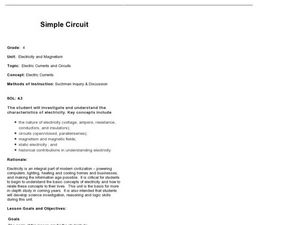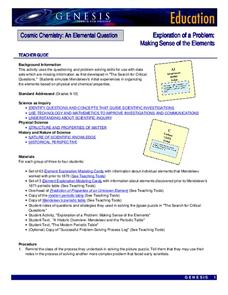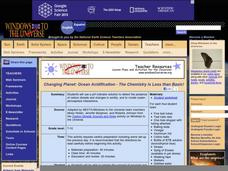Curated OER
Non-Compressibility of Water
Students will observe a property of water. For this inquiry-based properties of air lesson, students observe how a change in water pressure impacts the positioning of an eye-dropper in the water container and they make hypotheses about...
Curated OER
Desalination: Creating a Solar Still
To better understand how solar power can aid in creating desalinated drinking water, the class creates a model still. They will build a model of a solar still, make observations, and discuss how the process works. While the idea behind...
Curated OER
Simple Circuit: Electric Currents and Circuits
Through inquiry and exploration, 4th graders will learn and understand the functions of open and closed circuits. They will break into 2 groups, define vocabulary, hypothesize how to light a bulb, then test their hypothesis 4 different...
PHET
Earth’s Magnetic Field from Space
Feel the pull of science! The final installment of this 18-part series is an application of everything learned in the previous high school lessons. Scholars are given a magnetic field map and must propose an arrangement of magnets that...
Earth Day Network
Filtering Water
See the water filtration system up close with a fun science experiment. Young scientists work for several class periods to design a water filter using household objects, and then decide which filter material would be most effective in...
Kenan Fellows
What Is Heat?
If objects have no heat, how do they can gain and lose it? Scholars experiment with heat, temperature, and specific heat of various substances. They create definitions for these terms based on their own conclusions to complete the fourth...
Curated OER
The Birds of a Feather Flock Together
Fifth graders identify all parts of an egg, and explore their importance to the life cycle of a chicken. Learners compare all sorts of birds and place them in categories based on what they look like. This five-day lesson effectively...
American Chemical Society
Isolation of Phytochrome
Why do soybean plants that are planted weeks apart in the spring mature simultaneously in the fall? Four independent activities cover the history of phytochrome research, scientist collaboration, the electromagnetic spectrum, and...
NASA
Developing an Investigation
Watch as your class makes the transition from pupils to researchers! A well-designed lesson has scholars pick a solar wind characteristic to research. They then collect and analyze official data from the LANL website. This is the third...
Curated OER
Plant Power
Here is an opportunity for your first graders to take a close look at plants: what they need to survive, how they grow, and the names of each plant part. The book, Corduroy's Garden is used to open the lesson. Then, youngsters utilize...
NASA
Revising an Investigation
Write, edit, and then revise! The fourth lesson in a five-part series asks peers to provide feedback on research. Individuals then use the research to edit and revise conclusions and develop their presentations.
Curated OER
Friends on the Farm
Young farmers explore the world of farm animals. They are introduced to a variety of animals, what their role is, how many legs they have, and what sounds they make. Worksheets and websites embedded in the plan are used to carry it out....
Curated OER
The Good and Bad Bacteria
Students are able to name one kind of harmful bacteria and why it hurts us and also name one kind of helpful bacteria and how we use it. They describe the process of growing bacterial cultures in a lab. Students create a reasonable...
NASA
Exploration of a Problem: Making Sense of the Elements
When given too much data to simply memorize, it helps to sort it into manageable groups. The second lesson in the six-part series of Cosmic Chemistry challenges groups of pupils to take a large amount of data and figure out how to best...
Curated OER
Earth, The Universe, And Culture
Students examine how science is interpreted based on social environments. They watch and discuss a video, identify scientists and locate their countries of origin on a map, explore various websites, and complete a handout.
Curated OER
Changing Planet: Ocean Acidification - the Chemistry is Less than Basic!
A video and laboratory investigation are highlights to this lesson on acidification of ocean water due to increased atmospheric carbon dioxide. Using bromothymol blue (BTB) as an indicator, pupils analyze the amount of carbon dioxide...
Curated OER
The Five Classes of Vertebrates
What a terrific lesson! Learners discuss the animal kingdom, and classify them as vertebrates and invertebrates. They also identify them as fish, amphibians, reptiles, birds, and mammals. There is even a taxonomic breakdown of popular...
Mascil Project
Parachute Food Drop
Drop a perfect project into your lesson plans. Groups use different building materials to create models of parachutes for food drops. After testing out their prototypes, they make improvements to their designs.
Curated OER
Call to Arms: Robotic Analogues for Human Structures
Investigate deep sea discovery through the emerging technology being built. In this physical science instructional activity, young scholars analyze the different types of motion available in the human arm. Students research educational...
Education Development Center
Micro-Geography of the Number Line
Young mathematicians dive into the number line to discover decimals and how the numbers infinitely get smaller in between. They click the zoom button a few times and learn that the number line doesn't just stop at integers. Includes a...
NASA
Exploring Data
Bring the sun to your class! Young scholars analyze actual solar wind data in the second lesson of a five-part series. Their analysis includes speed, temperature, and density data.
Curated OER
Where are Koalas on the Food Chain?
Take a field trip to observe Koalas, absolutely! Budding scientists become familiar with the Koala's position in the food chain. They answer questions based on what they see and draw a food chain explaining the Koalas position. Tip: A...
Columbus City Schools
It’s Electric!
Shocking! Who knew so many great ideas existed for teaching middle schoolers about electricity? Find them all within this energetic framework. You'll light up at the variety of printable and web-based resources within! After building...
National Library of Medicine
Your Environment, Your Health: Air Quality
Some scientists argue that air pollution now causes more deaths than smoking. The second unit in a six-part series focuses on air quality. Scholars learn what's in the air, how clean the air around their school is, and what they can do...

























